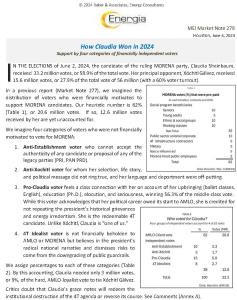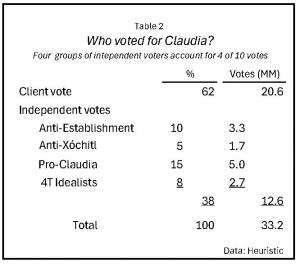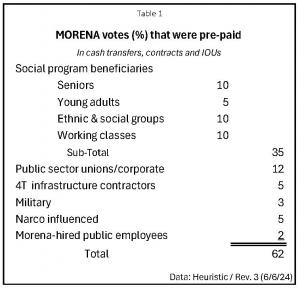Houston's Baker consultancy reports on the vote for Claudia Sheinbaum in the Mexican presidential election
Claudia received the support of four categories of financially independent voters, but she needed AMLO-loyalist voters to win
One challenge for the Sheinbaum administration will be to sustain popular support for AMLO's legacy while disavowing his energy irredentism”
HOUSTON, TX, UNITED STATES, June 7, 2024 /EINPresswire.com/ -- Two reports issued by Baker & Associates, an energy and policy consultancy that covers Mexico, examine the voter dynamics of the presidential elections held on Sunday, June 2. Claudia Sheinbaum, the candidate of the ruling MORENA party, received 33.3 million votes, over twice those of her nearest competitor, Xóchitl Gálvez, who represented a coalition of the legacy parties of the late 20th century. — George Baker
In the first report (Market Note 277), the authors that 62% of the votes received by Sheinbaum were by financially motivated people. The largest category of such voters is composed of beneficiaries of the diverse social programs devised by the administration of President Andrés Manuel López Obrador (AMLO). The president is well known for his slogan, “Attend first to the poor,” and for his lavish cash handouts to low-income populations, including seniors, young adults, and Indigenous communities, among others–and from whom political loyalty has been consistent.
A second category is the narco-intimidated vote. Cartels have benefitted from AMLO’s lenient policy of “Hugs not bullets.” The U.S. Government estimates that 30% of Mexican territory is effectively in the hands of drug cartels.
The report flags, as a third category, the military-contractor community: In an unprecedented pivot in official procurement policy, the army was given authority for the construction of major infrastructure projects, including an airport, a regional rail system, and a transisthmian corridor. In parallel, the energy ministry was given contractual authority for a new refinery. As many as US$30 billion in contracts may have been issued by direct award or restricted tender–without an international public tender, as required for major items by the US-Mexico-Canada Agreement of 2020 (USMCA). As the army was involved, procurement records are deemed confidential as matters of national security.
“Established and overnight contractors to the army and energy ministry had a strong motivation to vote MORENA,” observes George Baker, the principal author of the report.
The report asserts that Dr. Sheinbaum, as the ruling-party candidate, also benefitted from a huge financial advantage, She received funds from the National Electoral Institute (INE), as required by law, with a cap on total campaign expenditures. The candidate of the ruling party benefits from government propaganda and other means of electoral support. During the presidential campaign period of 2006, pro-government TV and radio spots were continual, as were others that were derogatory of Mr. López Obrador who was then a candidate. Additionally, by tradition, parties receive extra-legal funds from individuals, contractor rebates, interest groups, and industrial and financial elites.
These funds allowed the Sheinbaum campaign to hire armies of field workers, pay for months of media advertising, plaster wall-miles of publicity, and contract fleets of buses to transport voters to polling stations.
In the second report (Market Note 278), the authors identify four categories of voter who are not financially dependent on the social programs or procurement regimes of the AMLO administration. The report includes comments from observers who describe the outcome of the election in near-apocalyptic terms, citing the risk to the rule of law in a MORENA majority in congress from the removal of institutional guardrails against executive overreach. Others, in Mexico and abroad, congratulate the MORENA candidate and offer to collaborate with her in confronting the challenges ahead. The trade association of oil companies in Mexico, (AMEXHI) by its acronym, has offered to work with the new administration in a yet-announced framework for private oil exploration.
Opposition parties, stung by the lopsided vote for MORENA and its presidential candidate, are asking for a full recount, just as AMLO had done in 2006 when he lost the presidency by 0.6%.
“This election is destined to be as controversial as those of 1988 and 2006,” predicts George Baker, the principal author of the report, “but for different reasons. The earlier election controversies were about rigged vote counting. The controversies of the 2024 election will be about rigged vote buying, campaign finance violations, and the unprecedented support of ruling-party candidates by organized crime.”
"One challenge for the Sheinbaum administration will be to sustain popular support for AMLO's legacy while disavowing his energy irredentism," predicts Mr. Baker.
George Baker
Baker & Associates, Energy Consultants
+1 832-434-3928
email us here
Visit us on social media:
Facebook
X
LinkedIn
Other
Victory speech of Claudia Sheinbaum (in Spanish)
Legal Disclaimer:
EIN Presswire provides this news content "as is" without warranty of any kind. We do not accept any responsibility or liability for the accuracy, content, images, videos, licenses, completeness, legality, or reliability of the information contained in this article. If you have any complaints or copyright issues related to this article, kindly contact the author above.



